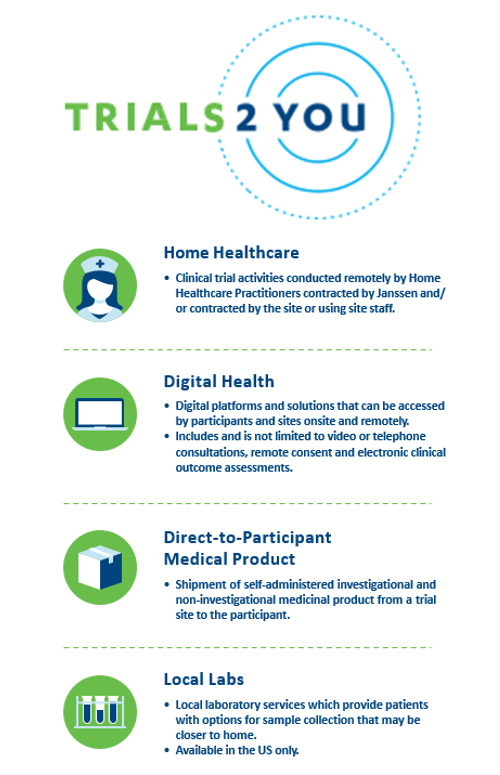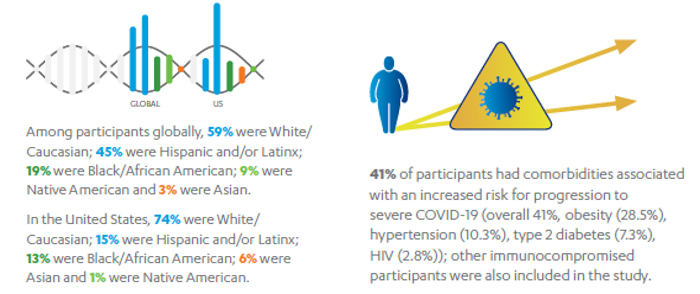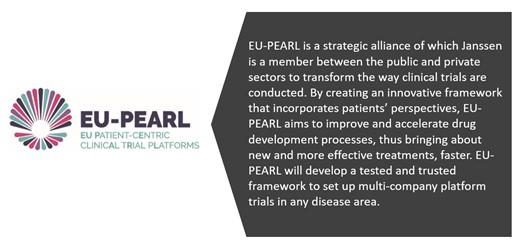Equitable Access: How Janssen is Re-Imagining the Future of Clinical Trials
What does “innovation” mean to you?
We hear it so often in today’s world; it appears as though everyone is innovating. In fact, it would almost seem odd if a core pillar of a company’s mission wasn’t “innovation” or an “innovative approach.” It may be hard to pin down a definition because innovation isn’t often tied to a single tangible output.
At Janssen Research & Development, we pride ourselves on insights-driven innovation. Our Credo guides us to focus first on patients and their caregivers, and to think about how we provide equitable access to medical care, including clinical research. We have methodically evolved the way we work to champion diversity and inclusion to support all patients’ unique needs, especially those from underserved and underrepresented communities, through Real-World solutions and providing personalized resources that help people to start and stay on clinical trials.
I was delighted to join several of my Janssen colleagues in a panel discussion to share our multi-disciplinary approach to enhancing equitable access to clinical trials at DPHARM 2021, a conference dedicated to disruptive innovation in clinical research.
Early-informed Decisions to Optimize Trial Design
Janssen’s Head, Feasibility Center of Excellence, Beth Mahon, spoke to how we apply insights from a range of sources to make early and informed decisions that transform trial design and improve the trial experience for patients and sites. The Feasibility team partners with our Data Science team to combine data and advanced analytics with operational insights to drive early strategic impact at a program level. Integrated use of real-time and relevant information allows for better prediction of clinical trial performance, quantitative risk-based decision making, and the ability to track and adapt trial execution as new data becomes available or circumstances change.
But the decisions we make mean nothing if the trial doesn’t reach trial participants, and we must reduce barriers to participation. Greg Tuyteleers, Janssen’s Global Lead, Decentralized Trials, explained how our Trials2You™ initiative helps. Within Janssen, we created Trials2You to make clinical trials more accessible and convenient through capabilities and technology that help to integrate the trial into the trial participant’s everyday life. Our focus is to advance the use of decentralized trial capabilities to support the conduct of elements of trials outside of traditional research centers.

We think of trial decentralization as a collection of capabilities that allow researchers to engage patients along the continuum of the trial journey in nonconventional ways. A trial can be fully virtual or utilize components such as a hybrid approach between the traditional brick and mortar research sites and a fully virtual approach.

While this had already been a major focus for us, the pandemic brought a realization that trial continuity couldn’t be guaranteed through traditional methods. The pandemic increased acceptance by regulators and adoption by healthcare professionals of trial decentralization, and equally important was that patients became more comfortable with these nonconventional care approaches.
Investigator & Patient Engagement
We embed the patient voice into everything we do, integrating cross-therapeutic learnings and patient insights to help elevate the scale and impact of clinical trial advancements for all patients we serve.
Maura Snyder, Global Head, Clinical Trial Engagement, spoke to our deep commitment to partnering with patients and participants and to working with them to build solutions to improve the trial experience. Maura’s team systematically engages with patients, caregivers and sites to ask, listen and act.
Insights are incredibly important to building effective strategies for Diversity, Equity & Inclusion (DE&I), and Maura’s team has spoken to more than 2,500 patients and caregivers, and surveyed many more, across 32 countries and all of our disease area strongholds to bring patient insights to the strategies we build for DE&I.
For DE&I, we focus on understanding barriers to participation in underserved and underrepresented populations and work directly with these individuals to understand these challenges and develop methods of overcoming them, reducing the burden of participation.
By successfully recruiting, enrolling, and engaging with underrepresented communities, we can work to ensure the therapies and treatments we develop meet the needs of all the groups who will rely on them.
Driving Diversity, Equity and Inclusion in Clinical Research
Cassandra Smith, Director, Diversity & Inclusion in Clinical Trials, shared more on how we are working to shape the future of clinical trials by ensuring they are more diverse, inclusive and equitable. Cassandra, who led our panel discussion, elaborated that we must leverage our learnings from the past year and develop deeper, long-term solutions and strategies.
An excellent example of the work we can draw from moving forward is our ENSEMBLE clinical study to test the safety and efficacy of our COVID-19 vaccine candidate. We leveraged insights, data and analytics to identify and implement opportunities to help reduce operational barriers and clinical trial participant burden and:
- Worked with community organizations to disseminate information and build trust in clinical research.
- Provided resources to educate underserved and underrepresented communities about clinical trials and opportunities to participate in clinical research, including our Research Includes Me campaign and website.
- Equipped healthcare personnel with educational materials and resources and prepared them for conversations about the importance of diversity and inclusion in clinical trials.
Our intentional focus and purposeful approach resulted in the following participant metrics:

We believe that diversity and inclusion in our clinical research studies is key to ensuring we are creating a more equitable healthcare landscape for all patients. To achieve this, we need to continue to build on our understanding of the impediments to equitable trial participation. Janssen is steadfastly working to better acknowledge, recognize and address the barriers preventing clinical trial participation for underserved and underrepresented populations, who face a variety of barriers that impact clinical trial enrollment—such as fear and mistrust, lack of awareness and logistical challenges. By doing this, we will be able to better support all participants across their journeys and ensure their voices are heard to develop treatments that better reflect their needs.
Shaping the Future of Clinical Research
So, what’s next for our teams? Tomorrow’s innovations begin with challenging the way we think today. We’re always looking for novel, unique ways to conduct, manage and support clinical trials. We’ve come a long way, but we still need to increase our reach, make our trials more patient-centric and further advance diversity, equity and inclusion in clinical research. We’re looking to do that in three ways:
- Nonconventional Trial Models: The evolution of decentralized clinical trials is moving beyond 100% virtual trials, to hybrid trials to a distributed model. We’re working to understand where the individualized options work best for patients across a wide range of settings. The value lies in the benefit these options have for patients; just because a method of patient involvement doesn’t see a large uptake doesn’t mean it’s not valuable. In fact, it could mean just the opposite—that we’re reaching patient groups that are traditionally missed in clinical studies. We must continue to scale up our ability to deliver tailored solutions to all the patients we serve.
- Disruptive Technology: We must develop novel methods for remote patient data collection and look for solutions that reduce the number of in-person site visits. We need longitudinal, higher-quality data to develop digital therapeutics that improve health outcomes. Our data should help us understand how a treatment interacts with a given genotype/phenotype, especially in underserved communities, where a lack of data on drug intake creates risk. We must have information on optimal dosing and treatment approach.
- Advanced Analytics: Data from a real-world setting is key to providing additional context in patient evaluation and better understanding disease progression and treatment responses across diverse populations. Advanced analytics are needed to continually support this endeavor, as the needs of our patients are ever-changing.
When we think about challenging the status quo and discovering new and novel approaches in clinical trials, we must also think about how and with whom we collaborate, not only today, but in the future. What entities, even those far removed from the healthcare industry, might have novel capabilities that could enhance our ability to execute clinical research.
An excellent example of this drive to embrace the unusual in clinical research is Janssen’s work with EU-PEARL, a strategic alliance between the public and private sectors in the EU to establish novel platform trial frameworks. This consortium unites key stakeholders from industry, academia, regulatory, methodology and patient advocacy groups, among others, to design Integrated Research Platforms inclusive of each body’s input for optimal outcomes.

Patients are waiting, and with unrelenting commitment and urgency, we apply our expertise, analytics and insights to drive meaningful solutions and to deliver a future where disease is a thing of the past.
October 5, 2021

